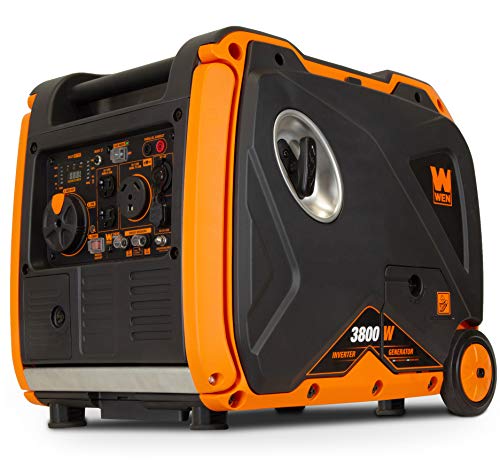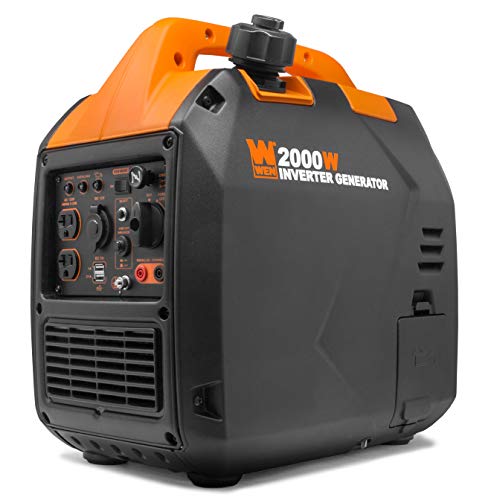As batteries and solar technology become less expensive and more advanced each year, the solar generator marketplace has opened itself up to several power solutions for off-grid use.
However, gas generators have been around for longer and have been a reliable solution for many people’s homes.
Both solar and gas generators compete in the same industry of off-grid backup power, yet they are completely different in their functionality.
Solar generators are better than gas generators for long-term use off the grid because they can recharge themselves with solar panels. Although gas generators are much less expensive upfront, they require refueling and can end up costing more than a similar-sized solar generator after years of use.
Gas and solar generators have a lot of differences that make them valuable depending on the situation or activity you intend to use them for. Later in this post, I’m going to show you direct comparisons between the two.
Not all gas and solar generators are the same type and size, so I’ll break down the various versions of both before getting into examples.
But first, I’ll explain in a bit more detail the advantages that solar generators have over gas-powered systems and vice versa.
Which is better – solar generator or gas generator?
As stated before, solar generators are ideal for long-term use over gas generators.
Solar generators are ideal partial home backup systems for both short and long-term power outages. Portable gas generators can provide full home backup power but are typically best only for short-term power outages as they need refueling every eight hours on average.
There are several additional elements to compare regarding gas and solar generators, such as the activity you intend to use it with, a breakdown of costs (short and long term), maintenance, and more.
Both systems are designed to power devices and appliances off the grid and to do it repeatedly for years. Gas generators do not last long unless they are constantly refueled. Both the cost of fuel and the dependency on it make most gas generators unreliable as a long-term backup power solution.
| Features Compared | Solar Generators | Gas Generators |
|---|---|---|
| Higher power output | X | |
| Longer running times | X | |
| Less expensive upfront | X | |
| Costs less to run | X | |
| Lower noise level | X | |
| Easiest to maintain | X | |
| Reduces cost of electricity | X | |
| Can be used indoors | X | |
| Self-sustaining | X |
Types of solar generators
There are two main types of solar generators : solar backup generators and portable solar generators. Both types can use solar energy to charge their batteries. Backup solar generators are mainly used for homes, whereas portable solar generators can either be used in a home or for other off-grid activities depending on their size.
: solar backup generators and portable solar generators. Both types can use solar energy to charge their batteries. Backup solar generators are mainly used for homes, whereas portable solar generators can either be used in a home or for other off-grid activities depending on their size.
1. Portable Solar Generators
A portable solar generator, depending on its size, can be used for camping, RVs, cabins, and partial home-backup power. Smaller models (Ex: Jackery Explorer 300) are used mainly for charging devices. Larger models (Ex: Yeti 6000X) typically stay in one location and can power large appliances.
2. Solar Backup Generators
Solar backup generators can provide either partial or full home-backup power during power outages. Some models can also be used to offset energy costs while being connected to the grid, which is called peak-load shifting .
.
Types of gas generators
In general, there are three types of gas generators: conventional, inverter, and standby generators. Conventional and inverter generators can be either portable or stationary, while standby generators are stationary. As a whole, gas generators run on at least one of the following fuels: gasoline, diesel, natural gas, and/or propane.
1. Conventional gas generators
A conventional gas generator produces AC power by running its engine at a constant speed (RPM). They are less efficient than most inverter generators. They can also damage sensitive devices like computers, smartphones, and other electronics because the AC signal can be distorted under heavy loads .
.
2. Inverter generators
Inverter generators convert DC power into stable AC power while its motor adjusts its speed (RPM) depending on the load, or power consumption required. This function makes inverter generators more efficient than conventional variants.
3. Standby generators
The largest type of backup gas generator is the standby generator. It is usually a stationary system that is used for backing up homes and businesses during grid failures. Due to their massive power outputs and gas reserves (typically diesel and/or natural gas), they tend to cost thousands of dollars.
Most standby generators are equipped with an automatic transfer switch (ATS), which automatically turns on the generator after a power outage is detected.
are equipped with an automatic transfer switch (ATS), which automatically turns on the generator after a power outage is detected.
Solar & gas generator comparisons
Below are five examples of gas and solar generators with similar AC output power ratings. The examples go from the largest to the smallest models.
The following are some clarifications for when you check out the data tables:
- My calculations on every solar generator’s “hours of runtime” in each table refer to a fully charged battery being depleted without the intervention of solar panel charging. With solar panels charging its battery while it’s discharging to power appliances, a solar generator has a longer runtime. I didn’t include this in my calculations.
- At the end of these examples is a table with fuel costs for each gas generator over time. This helps to estimate the overall costs of using each system, while also balancing out the differences in pricing between the solar and gas models.
Solar backup generator vs. standby gas generator
These are the largest types of generators you can get in both the gas and solar generator markets. Of course, there are larger examples than the ones I give below, but these are still powerful and can provide full home backup power.
| Generator Model | Generac Guardian 10kW | Tesla Powerwall+ |
|---|---|---|
| Image | 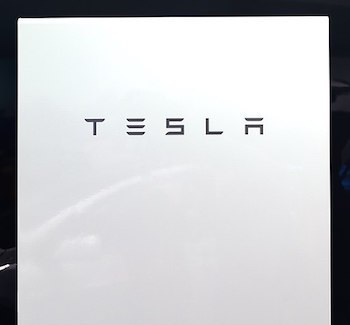 |
|
| Generator Type | Standby Gas | Solar Backup |
| Max Power Output | 10,000W continuous (liquid propane) 9,000W continuous (natural gas) | 9,600W continuous (full sun) 7,000W continuous (no sun) |
| Hours of Runtime (50% Load) | Indefinite (depends on tank size & gas line connection) | 3.4-3.7 hrs @ 3,500W (w/ no sun) |
| Price (Subject to Change) | $3,089.00 (not including installation & other expenses) | $10,500 (not including solar panels, installation, & other expenses) |
| Sources | Specifications Sheet | "How Powerwall Works " (Tesla) " (Tesla) |
For the Generac gas generator, its tank size refers to its liquid propane tank. These come in several sizes, but for this model, its tank is typically much larger than a standard one found with most outdoor grills. I’ll be discussing its tank size and cost later on.
The Tesla Powerwall and Powerwall+ require you to install Tesla solar panels on your roof in order to get the Powerwall. This adds significant costs to this system if you were to get it, but it can also add value to your home.
on your roof in order to get the Powerwall. This adds significant costs to this system if you were to get it, but it can also add value to your home.
In this comparison, it seems like the Generac gas generator would be the clear winner due to a higher output, longer running time, and lower upfront cost. However, the Generac consumes a lot of fuel due to its high output.
Both systems aren’t cheap, but when also considering that you can sell solar power back to the grid with the Tesla system, this may bring the overall costs of the Generac and Powerwall+ closer to even over time.
For a real-world example of solar savings over time, energysage has a great article with a table listing estimated solar savings by state .
.
Top-tier portable generators: solar vs. gas (7-10kW output)
The models below actually have similar power outputs as the previous models, but these ones are portable.
| Generator Model | DuroMax XP13000EH Dual Fuel Portable Generator | EcoFlow Delta Pro Portable Power Station (X2) |
|---|---|---|
| Image | 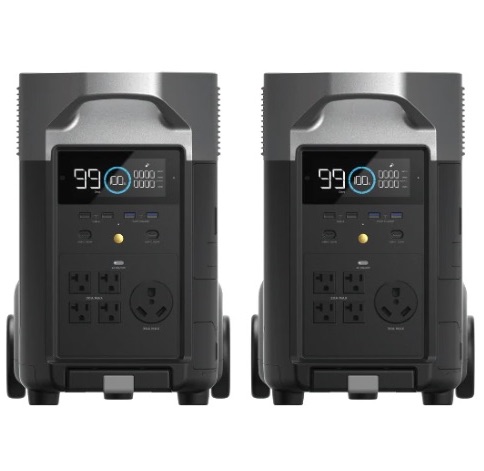 |
|
| Generator Type | Gas | Solar |
| Max Power Output | 10,500W continuous 13,000W peak | 7,200W continuous 7,200W peak |
| Hours of Runtime (50% Load) | 8.5 hrs @ 5,250W (gasoline) 6.5 hrs @ 4,988W (propane) | 1.6-1.8 hrs @ 3,600W |
| Price (Subject to Change) | $1,499 | $6,300-$7,200 |
| Sources | User Manual | EcoFlow manuals: Delta Pro  Double Voltage Hub  |
This gas generator is not an inverter generator, so it may not produce the same quality of electricity needed to charge/power sensitive devices and electronics.
With the EcoFlow Delta Pro, you can combine two units together with EcoFlow’s Double Voltage Hub (its manual is in the table). This allows you to run 240V appliances and achieve twice the power output of one Delta Pro. The Bluetti EP500 and EP500Pro can also do this, but the Delta Pro has a higher overall AC output.
The EcoFlow Delta Pro can also expand its battery capacity up to 25kWh. At this capacity, it can run at 50% load (3,600W) for 6-6.5 hours, and this is not factoring in solar recharging.
Large solar & gas generators (3-3.5kW output)
The Titan solar generator is among the best solar-powered generators available today. It has some additional features that I’ll get into after the table. It is up against an efficient inverter generator with a similar AC power output.
| Generator Model | WEN 56380i Portable Inverter Generator | Titan Solar Generator (w/ 2x Batteries) |
|---|---|---|
| Image | 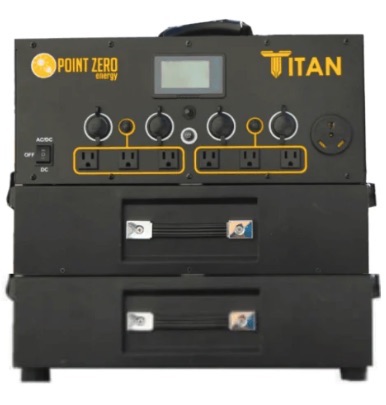 |
|
| Generator Type | Gas/inverter | Solar |
| Max Power Output | 3,400W continuous 3,800W peak | 3,000W continuous 6,000W peak |
| Hours of Runtime (50% Load) | 8.5 hrs @ 1,700W | 2.2-2.6 hrs @ 1,500W |
| Price (Subject to Change) | $699.99 | $4,800 |
| Sources | User manual | User manual |
Clearly, the WEN inverter generator is much cheaper than the Titan with a second battery. With a longer runtime and higher continuous power output, the numbers seem to put the WEN system as the obvious winner.
However, there are several qualities to the Titan that aren’t in the table:
- It can recharge with a 2,000W maximum solar input, which recharges its two batteries in as little as 2-3 hours.
- You can add as many batteries to the Titan as you want, which makes it capable of lasting much longer than the WEN generator. The only downside to this is that each additional battery costs over $1,000, which may not be feasible for most people.
- (Regarding above) if you want to attach a third-party battery that probably costs less, you can do that via an external battery port on the side of the Titan.
The real question to ask yourself when deciding on these options is “what will I use it for?” If you don’t have many power outages and just want a generator that will do its job every once in a while for an hour or two, then the WEN is the best option.
If you’re looking for a system that can provide not only backup power but also help reduce utility costs, then the Titan might be the ideal option. Another area where the Titan would be superior is an extended power outage. Unless you have a large reserve of gasoline available, the WEN system will last about 1/3 of a day before refueling is needed.
Each battery added to the Titan increases its half-load runtime by about an hour, plus, it has pass-through charging, so you can charge it from solar while using it.
More information on the Titan can be found in my review of it here: Titan Solar Generator Review – The Best Large Solar Generator?
Gas vs. solar generator in the 2kW output range
These two models have similar continuous power outputs, but they are of different sizes. The WEN generator is a small gas generator, whereas the Yeti 3000X is a large solar generator.
As you can see, the price difference is staggering.
| Generator Model | WEN 56203i Portable Inverter Generator | Goal Zero Yeti 3000X Power Station |
|---|---|---|
| Image | ||
| Generator Type | Gas/inverter | Solar |
| Max Power Output | 1,700W continuous 2,000W peak | 2,000W continuous 3,500W peak |
| Hours of Runtime (50% Load) | 7 hrs @ 850W | 2.5-2.8 hrs @ 1,000W |
| Price (Subject to Change) | $410.99 | $3,399.95 |
| Sources | User Manual | User Manual |
At over eight times the price of the WEN, the Yeti 3000X is a hefty investment – especially if you only need the generator for a short-term backup power source.
You could opt for the smaller Yeti model, the Yeti 1500X, but it will still cost about $2,000 and have half the runtime.
If I just wanted a backup power source for my fridge when there’s an outage, the WEN is the clear-cut winner.
1,000W portable generator matchup: gas vs. solar
The TogoPower generator is small for a portable gas system, but the Bluetti EB240 is a large solar generator with below-average output power for its size.
What sets this comparison apart from the previous ones is the hours of runtime. The EB240 is much closer to the TogoPower model.
| Generator Model | TogoPower Portable Gas Generator | MAXOAK Bluetti EB240 Power Station |
|---|---|---|
| Image | ||
| Generator Type | Gas | Solar |
| Max Power Output | 800W continuous 1,000W peak | 1,000W continuous 1,200W peak |
| Hours of Runtime (50% Load) | 6 hrs @ 400W | 4.2-4.5 hrs @ 500W |
| Price (Subject to Change) | $199.99 | $1,399.99 |
| Sources | User Manual | User Manual |
Like all of these comparisons, the biggest difference is in price. Since it’s such a steep difference, it still comes down to what you intend to use it for.
You’ll have extended off-grid power with the EB240, but if you don’t need that capability, it’s obviously best to get the system that’s a whopping $1,200 cheaper.
Are gas generators expensive to run?
Gas generators are expensive to run depending on: fuel type, fuel consumption, power output, and runtime. Gasoline, diesel, and propane generators cost more to run than ones powered by natural gas. Inverter generators tend to be more efficient than conventional gas generators, costing less to run.
Below I have a table with five different gas-powered generators along with their estimated costs over time.
The data in the table includes the following assumptions:
- Gasoline price: $3.40/gal
- Natural gas (NG) price: $7.03/thousand cubic feet
- Propane (LP) price: $3/gal using 500 gallon tank
 (for Generac); $3.50/gal refill cost for 40 lb tank (for DuroMax)
(for Generac); $3.50/gal refill cost for 40 lb tank (for DuroMax)
| Gas Generator Model | 1/2 Load Fuel Consumption | 1/2 Load Est. Cost (24-hr Runtime) | 1/2 Load Est. Cost (1-Week Runtime) | 1/2 Load Est. Cost (3-Week Runtime) |
|---|---|---|---|---|
| Generac Guardian 10kW | 2.86 m3/hr (NG) 0.97 gal/hr (LP) | $17.04 (NG) $69.84 (LP) | $119 (NG) $489 (LP) | $358 (NG) $1,467 (LP) |
| DuroMax XP13000EH Dual Fuel Portable Generator | 1.04 gal/hr (gas) 1.57 gal/hr (LP) | $84.66 (gas) $132.16 (LP) | $593 (gas) $925 (LP) | $1,779 (gas) $2,775 (LP) |
| WEN 56380i Portable Inverter Generator | 0.2588 gal/hr (gas) | $21.12 | $148 | $444 |
| WEN 56203i Portable Inverter Generator | 0.1429 gal/hr (gas) | $11.66 | $82 | $245 |
| TogoPower Portable Gas Generator | 0.175 gal/hr (gas) | $14.28 | $100 | $300 |
As seen above, the price of running a gas generator mostly depends on:
- The type of gas used
- The efficiency of the generator
- The total runtime
Natural gas (NG) costs significantly less than propane (LP) when comparing the same runtimes for the Generac generator.
The inverter generators and small generators using gas consume very low amounts per hour compared to the bigger DuroMax model.
Estimating yearly hours of runtime
Yearly hours of runtime needed from your generator can’t really be predicted, but where you live and your experience in prior years with outages can help.
For example, I live in Chicago and we’ve had 3-4 outages in the past year. One of them was for about six hours, while the others were no longer than two. This totals about 12 hours off the grid – I can factor that into estimating future runtimes if this has been a pattern over the years.
Although the average power outage in the U.S. was relatively short-lived (roughly 2-4 hours) based on 2016 data, some areas can experience extended power outages.
“Excluding major events, the average electricity customer outage durations in 2016 ranged from 27 minutes in Nebraska to 6 hours in West Virginia. When major events are included, Hurricane Matthew caused South Carolina’s power outage duration to be the highest in the nation for 2016, averaging more than 20 hours per customer.”
U.S Energy Information Administration
Unfortunately, natural disasters can significantly extend the duration of power outages. Where I live, tornadoes and powerful storms have caused this to happen multiple times over the years. On the coasts, hurricanes and tropical storms can cause massive power outages.
“Forty propane tanks. That’s what my family needed during Hurricane Sandy, a 10-day power outage, to keep just the essential parts of our house running for part of each day.”
Jamie Friedman of Frontier Group
Even though it’s not entirely possible to get an accurate future runtime with a generator, having a backup plan is a must to ensure your home has off-grid power.
Conclusion
Gas-powered generators have been in the industry for a while. They have a lot of power, and also can run for a long time.
However, solar generators cost less over time, have no sound when in use, and require much less maintenance.
When it comes to being reliable, it makes sense to go electric. A solar generator for your home can bring the extra power needed in those just-in-case power outage situations.
For more information on solar-powered generators, check out my reviews below, where I show you which models are the best for various activities/applications:





